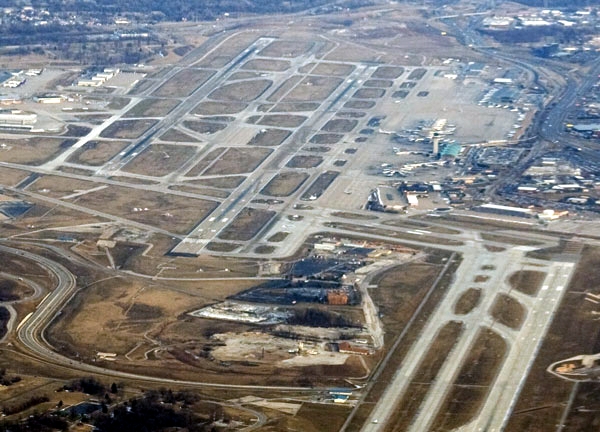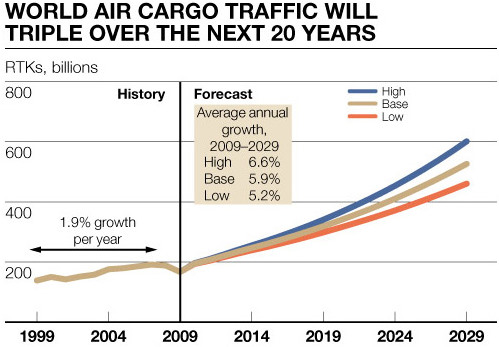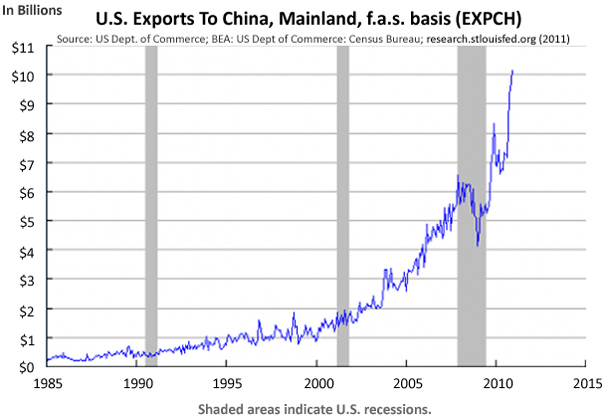 Last week KMOX’s Charlie Brennan chimed in again on the Aerotropolis tax credits. This time he was assisted by Michael Webber, the owner of a cargo consultancy, in his anti-aerotropolis bill crusade. Brennan has been very vocal about how the tax credits couldn’t work, comparing them to other “silver bullet projects”. On KETC’s Donnybrook program recently, he was upset about giving the Chinese tax breaks “to make it even easier for them to take our jobs and ship their goods to the US.”
Last week KMOX’s Charlie Brennan chimed in again on the Aerotropolis tax credits. This time he was assisted by Michael Webber, the owner of a cargo consultancy, in his anti-aerotropolis bill crusade. Brennan has been very vocal about how the tax credits couldn’t work, comparing them to other “silver bullet projects”. On KETC’s Donnybrook program recently, he was upset about giving the Chinese tax breaks “to make it even easier for them to take our jobs and ship their goods to the US.”
With such statements Brennan continues to display his lack of understanding of China in general and the cargo hub concept at Lambert Airport. Brennan’s guest on the show, consultant Webber, asserted that it is nearly impossible to start up a new cargo hub today because current networks have long been established and freight forwarders, logistics companies and distributors will not change their routes and networks to accommodate a new hub. He stated: “cities don’t build hubs, airlines and freight forwarders do.”
In this case we’re talking about China Eastern Airlines. Within this context, we must review the International cargo hub concept one more time:
The Chinese do not need incentives to ship goods to the US. In fact, 80% of Chinese imports here are shipped by American carriers. These carriers are all making a decent profit using their nationwide networks to accommodate current operations.
The Chinese wish to fly at least 50% of their exports on their own carriers. They think they can achieve this by building their own logistics network in the US, around a hub of their own. This cannot be accomplished in Chicago, Dallas, Miami or Los Angeles because American counterparts have already established mature and vast networks at these locations and elsewhere. This is one reason China is looking at St. Louis.
If Lambert were talking with an American cargo operator I would largely agree with Webber’s assertion that setting a new hub is unrealistic. However, we’re dealing with the Chinese. China is flush with cash. They are able to invest vast amounts of money to realize logistics goals, in fact, much more so than their American competitors combined. (China will be building 100 cities of at least a million people and 100 new airports in China over the next 25 years.) The Aerotropolis tax incentives are not used to support potential inbound flights from China. The Aerotropolis bill would give tax breaks to shippers for exporting goods to China, not the other way around.
 The Chinese have the money to start up operations here and to perform the flights back and forth to China. The incentives are meant to entice logistics companies, shippers and freight forwarders to open up shop here and create the necessary networks. The cargo experts are right. It will be tough to convince the freight companies to commence operations here. The investments and risks are high – exactly what the Aerotropolis tax credits are supposed to alleviate.
The Chinese have the money to start up operations here and to perform the flights back and forth to China. The incentives are meant to entice logistics companies, shippers and freight forwarders to open up shop here and create the necessary networks. The cargo experts are right. It will be tough to convince the freight companies to commence operations here. The investments and risks are high – exactly what the Aerotropolis tax credits are supposed to alleviate.
There remains a deeply held misconception that China is fleecing us of our jobs and money. Remember when everything was “Made in Japan” in the 70’s? 10 years later everything was “Made in Taiwan”. These are the cycles the global economy is going though. Now everything is “Made in China”. The worst and lowest paid jobs will keep shifting to new developing countries that can provide the cheapest labor.
Every iPhone on the planet is made in Shenzhen, China. Yet 70% of what you pay for your phone goes to Apple in Cupertino, California. Despite the fact that the phones are produced in China they receive just 30% of the pie. More money in the new economy is made through innovation and creativity. Only high-end products, like the airplanes the Chinese will be buying from Boeing to fly their goods here, are worth manufacturing in developed countries and the US is still number one in that department.
Aerotropolis opponents like the Show-Me-Institute keep hammering on the fact that there are no guarantees from the Chinese to start operations. They repeat ad nauseam: why promise up to $ 360 million in tax credits if there’s no guarantee that this will pan out.
In business there are no guarantees. Besides, the tax credits are not guaranteed either. If the Chinese decide against the Lambert idea, who is going to build warehouses around the airport with operations supporting international air freight? The answer is: no one. What will the Aerotropolis bill cost Missouri tax payers if the cargo hub doesn’t happen? Zero dollars. No international air freight activity, no tax credits.

And who are these people that so vehemently oppose the Aerotropolis tax incentives?
- Charlie Brennan – a fantastic radio host who unfortunately doesn’t understand the cargo hub concept, China’s meteoric rise in the global economy or the Aerotropolis bill. I highly doubt he’s read it. He’s in the business of…being Charlie Brennan. (I am a big fan.)
- Michael Webber – a cargo consultant without a website who happens to be based near, you guessed it, the airport NOT directly benefiting from the bill: Kansas City. He is also currently contracted by Chicago’s Department of Aviation (read: O’Hare International Airport). It speaks for itself that The Show-Me-Institute was overjoyed with his views. They posted his story immediately on their website without checking the facts or Webber’s expertise (motives?) in this matter.
- The Show-Me-Institute “policy analysts” – often unseasoned researchers paid to promote an agenda of libertarian, free market ideas. They cling to Rand-esque concepts of the 50’s without grasping the new challenges and opportunities of globalization. They rail against big government, conveniently forgetting the fact that Missouri receives $1.30 from that same government for every tax dollar paid.
Missouri is currently a welfare state. That’s why we need new economic development, connections to the global economy and stop playing regional musical chairs. And remember, we are all policy analysts. When we read an article like this and form our own opinions we are analyzing policy. To paraphrase the words of JFK: “Ich bin ein policy analyst.”


